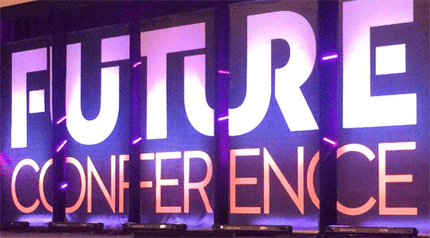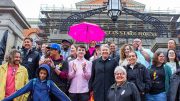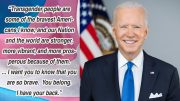
Most anti-gay and anti-marriage equality haters, and religious freedom proponents attended this conference. Their words carry much hatred and discrimination, and “no love for thy neighbor.” This undercover exclusive from Media Matters takes us into the world of hating LGBTs just for who they are.
Photo: Media Matters
Media Matters LGBT Program Director Carlos Maza Goes Undercover At The Religious Right’s Anti-LGBT “Future Conference”*
One week before the Supreme Court ruled in Obergefell v. Hodges that bans on same-sex marriage are unconstitutional, a group of the country’s most prominent anti-LGBT activists met at the Skyline megachurch in San Diego to discuss what their next steps should be in the fight against LGBT equality.
The meeting was part of the 2015 Future Conference, an event organized by Skyline Pastor Jim Garlow in order to respond to “the thorniest and most challenging issues in the current cultural landscape.”
In promotional materials for the gathering, Garlow warned “our nation is in trouble” due to the lack of a “clear proclamation of biblical answers to the messiness of our culture.” According to Garlow, pastors can no longer speak out about things like homosexuality because they are considered “political.” [pullquote]Shielded from the eyes and ears of major media, speakers at the Future Conference expressed the kind of casual homophobia that would otherwise offend mainstream audiences. [/pullquote]
The four-day conference, which Media Matters attended undercover, featured presentations covering a range of issues—from the threat of Islam to “biblical economics”—but its unifying theme was the alleged rise of Christian persecution across the globe, and especially in the United States as a result of growing acceptance of LGBT people.
The list of over 50 speakers spanned the conservative political landscape and included members of Congress, Fox News contributors, and prominent right-wing activists. Senator James Lankford (R-OK), Rep. Jody Hice (R-GA), and former Speaker of the House Newt Gingrich submitted video remarks. There was even a presentation from Suzan Johnson Cook, former Obama administration Ambassador-at-Large for International Religious Freedom. [pullquote]In a video message to the conference. Liberty Counsel founder Mat Staver compared a Supreme Court decision legalizing marriage equality to Dred Scott, the infamous Supreme Court decision that found African Americans were not American citizens. [/pullquote]
The conference also featured speeches from some of the most prominent anti-LGBT groups in the country, including several organizations designated as “hate groups” by the Southern Poverty Law Center: the Family Research Council (FRC), Liberty Counsel, and Catholic Family and Human Rights Institute (C-FAM).
Shielded from the eyes and ears of major media, speakers at the Future Conference expressed the kind of casual homophobia that would otherwise offend mainstream audiences. More importantly, they discussed their plans for dealing with a country seems increasingly determined to protect LGBT people from discrimination.
Speakers at the Future Conference presented many of the same homophobic talking points that have defined the religious right for the past several years. Many disparaged same-sex relationships as destructive and unhealthy. Frank Schubert—the political strategist behind many of the country’s most successful anti-LGBT campaigns— told his audience that “sexual entanglements” between gay men pose “substantial risk of harm,” and called gay sex “inherently unhealthy”:
The Rainbow Flag of Tolerance
Others decried LGBT activists as being overly-aggressive and totalitarian. “The rainbow flag of tolerance has become the dark flag of tyranny overnight,” warned Everett Piper, president of Oklahoma Wesleyan University. Conservative columnist Star Parker lamented that “homosexuality is now dividing us and bringing hostility into the public square. They’re coming out of the closet—they’re forcing the church in.” Michael Brown, an anti-LGBT activist known for showing up at gay pride events to badger attendees, declared that the “gay revolution has within itself the seeds of self-destruction.”
FRC Vice President for Church Ministries Kenyn Cureton, in a presentation about mobilizing churches to get involved in political battles, described LGBT activists as “pawns of a malevolent master.”
Outside the conference’s main auditorium, organizations set up displays to hand out promotional materials about their work. FRC’s display included copies of its “Debating Homosexuality” booklet, which falsely claims that gay men are more likely to engage in pedophilia than heterosexual men.
The Future Conference’s homophobic content was unsurprising given the venue. In 2008, Garlow’s Skyline Church was at the epicenter of the religious fight against California’s Proposition 8. At the time, Garlow convened a call with 1,000 ministers to discuss tactics for banning same-sex marriage in the state—tactics that ultimately proved successful in mobilizing religious support for the ballot measure.
Less than a decade later, Garlow and his allies were meeting under very different circumstances.
Same-sex marriage had become legal in a majority of states, including California. Public opinion was firmly in favor of marriage equality, and religious opposition to same-sex marriage was giving way to religious acceptance and support. Most speakers were correctly predicting that Obergefell would result in the Supreme Court legalizing nationwide marriage equality.
That looming reality gave the Future Conference a sense of urgent and sober realism. Beyond making their typical anti-gay remarks, speakers explained how they planned to stop, or at least slow, the push for LGBT equality in America.
Civil Disobedience
One of the recurring themes at the Future Conference, especially in reference to Obergefell, was the suggestion that Christians are not obligated to obey the laws of man if they contradict the laws of God. [pullquote]One of the recurring themes at the Future Conference, especially in reference to Obergefell, was the suggestion that Christians are not obligated to obey the laws of man if they contradict the laws of God.[/pullquote]
In a video message to the conference. Liberty Counsel founder Mat Staver compared a Supreme Court decision legalizing marriage equality to Dred Scott, the infamous Supreme Court decision that found African Americans were not American citizens. “Our highest respect for a higher law,” Staver said, “requires that we not give respect to an unjust decision.” He explicitly suggested that religious adoption agencies should refuse to place children in households headed by same-sex couples, adding that the Supreme Court lacked the power to enforce its decisions.
That sentiment was echoed by several other speakers, including Schubert, who argued that a constitutional convention might be needed to override an “illegitimate” decision on same-sex marriage from the Supreme Court. NOM’s Brian Brown touted his organization’s “Presidential Marriage Pledge,” which—in addition to calling for a constitutional amendment banning same-sex marriage—asks presidential candidates to pledge to work to “overturn any Supreme Court decision that illegitimately finds a constitutional ‘right’ to the redefinition of marriage.” [pullquote]He [Mat Saver] explicitly suggested that religious adoption agencies should refuse to place children in households headed by same-sex couples, adding that the Supreme Court lacked the power to enforce its decisions.[/pullquote]
The civil disobedience canard has gained popularity among anti-LGBT activists and even GOP presidential candidates, who have similarly compared Obergefell to Dred Scott and suggested that Americans should simply refuse to acknowledge the Supreme Court’s authority.
Fighting Non-Discrimination Protections
Speakers also touted efforts to undermine and sidestep non-discrimination laws that would prohibit them from discriminating against LGBT people on the basis of sexual orientation or gender identity. Steve Riggle, a Houston pastor at the center of the national controversy surrounding Houston’s Equal Rights Ordinance (HERO) earlier this year, decried the city’s attempt to extend “special rights” to LGBT people, peddling the myth that sexual predators would exploit the law by pretending to be transgender and sneaking into women’s restrooms.
In a session titled “Homosexual Marriage – Obliterating Religious Liberty,” Alliance Defending Freedom (ADF) senior counsel Kevin Theriot warned audience members that non-discrimination laws threaten the freedom of churches and businesses to act out their faith. ADF has been at the forefront of representing business owners who refuse service to gay customers, arguing that religious businesses should be exempt from non-discrimination protections. It’s also the group behind the national push for state “religious freedom” laws, which would give business owners a legal defense for refusing service to gay customers. He offered audience members copies of ADF’s booklet “Protecting Your Ministry,” which offers advice on how for-profit businesses and churches can avoid non-discrimination lawsuits.
“Are you willing to do what it takes to prepare yourself for the coming onslaught?” Theriot asked before describing how churches might insulate themselves from discrimination complaints. One tactic, advised Theriot, is to take advantage of the ministerial exemption to non-discrimination laws by broadly defining “ministers” to include employees like IT technicians and food bank workers.
NOM’s Brown encouraged attendees to throw their support behind the First Amendment Defense Act (FADA), which had just been introduced in Congress and would shield businesses and individuals from being denied tax exemptions, grants, licenses, certifications, or grants from the federal government as a result of their opposition to same-sex marriage. FADA has been criticized for creating a national license-to-discriminate against gays and lesbians, but the measure has since quickly gained support among anti-LGBT groups and conservative media outlets.
Influencing The Media
Beyond a political agenda, speakers at the Future Conference also talked a great deal about influencing public debates about LGBT issues, especially through the media.
Ted Baehr, Chairman of the Christian Film & Television Commission, touted efforts to inject Christian themes and imagery into mainstream television and film. Shows like “Will & Grace,” he argued, had gotten society comfortable with an “illegal, demonic form of marriage.” Using Hollywood to expose the public to Christian values is, according to Baehr, a key step in turning the tide in America’s culture war.
Other speakers were more concerned with coverage of LGBT issues in news outlets. In a presentation titled “Dealing With Media,” conservative author and right-wing activist Jason Mattera suggested that the key to winning public opinion was to invert the dominant media narrative about LGBT equality by decrying LGBT activists as intolerant bullies while painting religious conservatives as the real victims in the culture war. [pullquote]But it also represents the new reality facing the anti-LGBT right after Obergefell. Having lost the national debate over same-sex marriage, anti-LGBT conservatives are adapting to a political environment that increasingly pits their animus against the force of the state and public opinion. How the religious right chooses to deal with that new reality—whether with disobedience, resignation, or legal maneuvering—will set the stage for the next phase of the fight over LGBT equality. [/pullquote]
Leftists are “the most intolerant, bigoted people on the planet. And that is, they want Christianity purged from the public square,” Mattera declared. He urged his audience to portray the fight for LGBT equality as intolerant when talking to reporters or appearing on TV: “Why do they hate diversity? Why do they hate tolerance? I’m for a multiplicity of viewpoints. Isn’t that what America is about? Why does that person want to compel me to do something I don’t want? What is it about fascism that appeals to them?”
That “flip the script” tactic — essentially calling LGBT activists bullies — has been widely successful in influencing conservative media coverage of the fight for LGBT equality in recent years. Stories about anti-gay bakers and florists who are fined for refusing service to gay customers have helped motivate the recent wave of “religious freedom” laws and gin up opposition to non-discrimination efforts that protect LGBT people.
Despite the Future Conference’s anti-gay rhetoric, a recurring theme was the need to mimic the very tactics used by the LGBT community to win acceptance from American public. Conservative activist Lance Wallnau lauded the LGBT movement for its unified and media-savvy public relations efforts, encouraging his audience to look at the success of the fight for same-sex marriage as a blueprint for how conservatives might take back the culture war.
Near the end of the conference, NOM’s Brown warned conference-goers that “the days of comfortable Christianity are over”:
BROWN: Things have been good a long time for us. We don’t experience the sort of persecution that we’re witnessing in the Middle East. We don’t fear for our lives in coming together and worshipping. We’ve felt for a long time that we’re a part of dominant culture. And over the course of the last decade or so, maybe a little longer, we’ve realized that’s not the case. Things are starting to change, and that, to put it bluntly, the days of comfortable Christianity are over.
A Supreme Court decision in favor of marriage equality, Brown argued, would put conservative activists in the same position that anti-abortion activists were in after Roe v. Wade.
That sentiment, echoed by many of the conference’s speakers, represents a seismic shift in the way that anti-LGBT groups and activists have oriented their work. Their political agenda, which once prioritized a constitutional amendment banning same-sex marriage, has become largely defensive, focused on staving off the rising tide of LGBT equality.
That agenda is no less dangerous—threatening even the most basic non-discrimination protections for LGBT people. But it also represents the new reality facing the anti-LGBT right after Obergefell. Having lost the national debate over same-sex marriage, anti-LGBT conservatives are adapting to a political environment that increasingly pits their animus against the force of the state and public opinion. How the religious right chooses to deal with that new reality—whether with disobedience, resignation, or legal maneuvering — will set the stage for the next phase of the fight over LGBT equality.







